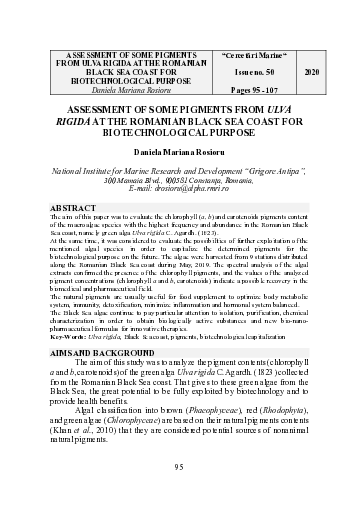Assessment of some Pigments from Ulva rigida at the Romanian Black Sea Coast for Biotechnological Purpose
DOI:
https://doi.org/10.55268/CM.2020.50.95Keywords:
Ulva rigida, Black Sea coast, pigments, biotechnological capitalizationAbstract
The aim of this paper was to evaluate the chlorophyll (a, b) and carotenoids pigments content of the macroalgae species with the highest frequency and abundance in the Romanian Black Sea coast, namely green alga Ulva rigida C. Agardh. (1823). At the same time, it was considered to evaluate the possibilities of further exploitation of the mentioned algal species in order to capitalize the determined pigments for the biotechnological purpose on the future. The algae were harvested from 9 stations distributed along the Romanian Black Sea coast during May, 2019. The spectral analysis of the algal extracts confirmed the presence of the chlorophyll pigments, and the values of the analyzed pigment concentrations (chlorophyll a and b, carotenoids) indicate a possible recovery in the biomedical and pharmaceutical field. The natural pigments are usually useful for food supplement to optimize body metabolic system, immunity, detoxification, minimize inflammation and hormonal system balanced. The Black Sea algae continue to pay particular attention to isolation, purification, chemical characterization in order to obtain biologically active substances and new bio-nano-pharmaceutical formulas for innovative therapies.
Downloads
Published
2020-12-20
How to Cite
Rosioru, D.-M. (2020). Assessment of some Pigments from Ulva rigida at the Romanian Black Sea Coast for Biotechnological Purpose. Cercetări Marine - Recherches Marines, 50(1), 95–107. https://doi.org/10.55268/CM.2020.50.95
Issue
Section
ORIGINAL ARTICLES
License
This is an open access journal, which means that all content is freely available without charge to the user or his/her institution. Users are allowed to read, download, copy, distribute, print, search, or link to the full texts of the articles, or use them for any other lawful purpose, without asking prior permission from the publisher or the author. This is in accordance with the BOAI definition of open access.






